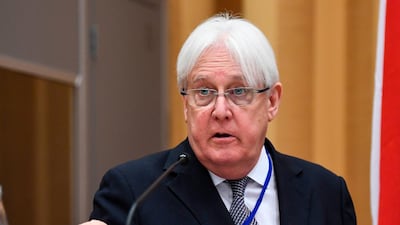The UN's special envoy for Yemen has given a warning that drone strikes on two Saudi oil facilities is "really bad news for me and for anyone trying to end the conflict in Yemen".
Martin Griffiths said on Monday that he would call for the UN Security Council to support efforts to "restart urgently the political negotiations to end the war".
Washington says Iran, supporters of the Houthi rebels, is behind the attacks that have catapulted oil prices.
US Secretary of State Mike Pompeo said on Sunday that there was “no evidence the attacks came from Yemen”.
"I really, really hope they're right, because that would make it much more difficult to resolve the conflict in Yemen," Mr Griffiths told the BBC.
“If they did not come from Yemen, the fact the Houthis claim they did gives some sense to the critics… that they’re part of an axis with Iran.”
US President Donald Trump said his country was "locked and loaded" to respond after the drone attacks on an oil processing plant and an oilfield, which have threatened global oil supplies.
The explosions, which took place on Saturday, set off fires that at the Abqaiq plant, the world's largest oil processing facility, and nearby Khurais.
Saudi Aramco said the production of 5.7 million barrels of crude a day had been suspended after the attack but that work was under way to restore production.
On the conflict in Yemen, Mr Griffiths said that regional stability would be threatened if the situation continued to deteriorate without a political resolution.
“We’ve had serious fighting in the south of Yemen – an existential threat to Yemen, I believe,” he said.
“We have a Yemen that is fragmenting and threatening its own existence which is a massive threat to stability in the region and shipping lanes.”
Mr Griffiths, appointed by the UN in 2018 to bring conflicting sides together around the table, urged political leaders and key players to help bring an end to regional instability.
“We need to waste no more time to get to the table and get an agreement to end the conflict,” he said.
“Please God, let’s get moving”.

